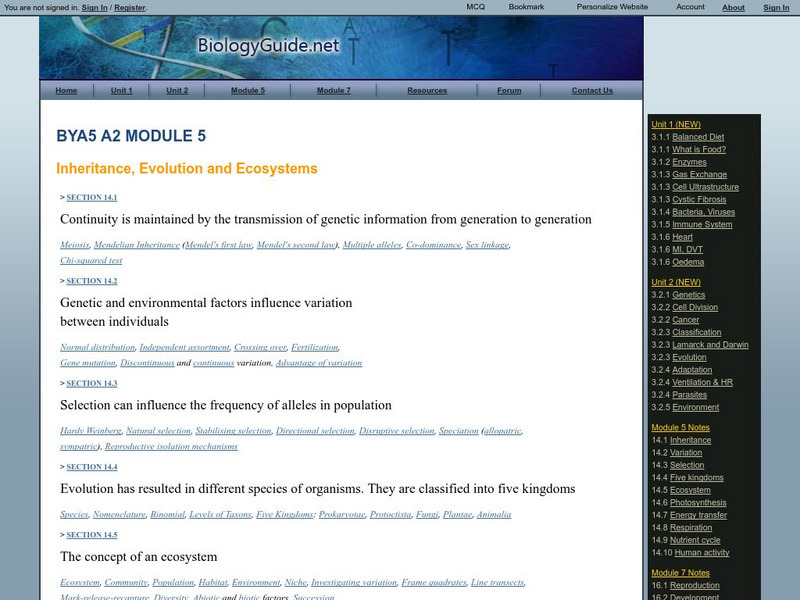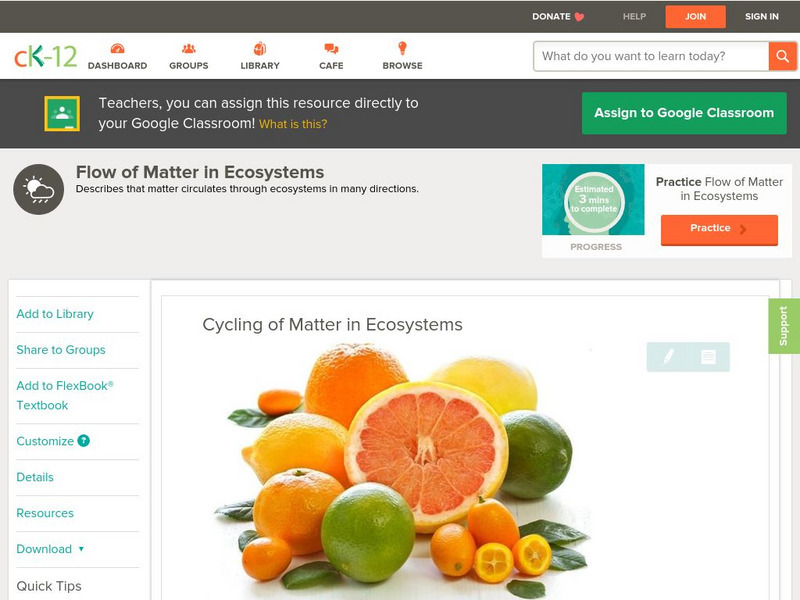Hi, what do you want to do?
Science Matters
Ecosystem Pre-Assessment
Test scholars' knowledge of ecosystems with a 20-question pre-assessment. Assessment challenges learners to answer multiple choice questions, read diagrams, and complete charts.
Science Matters
Post-Assessment
Twenty questions make up an assessment designed to test super scientists' knowledge of ecosystems. Scholars answer multiple-choice and short-answer questions about organisms, food chains, energy flow, and more.
Curated OER
Plants and Animals Depend Upon One Another
First graders study plants and animals and how they depend on one another. They also study that plants give energy to animals and provide oxygen needed for life. Finally, 1st graders give examples of the roles plants and animals play...
National Park Service
Reduce Our Carbon Footprint, Let’s Compost!
Roll up your sleeves and get a little dirty with this elementary and middle school compost lesson. All you need is a large plastic container, a couple old newspapers, some organic waste, and a few hundred worms and you're ready...
Curated OER
This is Jeopardy: Fifth Grade Life Science Review
This PowerPoint provides a Jeopardy game board and science questions from a variety of topics including biomes, plants, life cycles, cells, and the water cycle.
Curated OER
The Formation and Value of Temperate Grasslands
Students study the Temperate Grasslands biome of North America. They explain that it is an endangered ecosystem because the rich soils have been converted to farming in most areas. They view videos imbedded in this plan, then complete...
Curated OER
Commonalities and Differences from Africa to Cleveland as Evidence Through the Gullah Community Connection
Learners explore Afro-American history. They identify the commonality between African, Carolinian and Cleveland Black culture. Students explore the water cycle, oceanography, hydrology and bio-geochemical processes. They discuss the...
Other
Inheritance, Evolution, and Ecosystems
Students learn about inheritance, evolution, and ecosystems. Some topics explored in the tutorial are five kingdoms, respiration, energy transfer, and nutrient cycle.
TeachEngineering
Teach Engineering: Biodomes
Students explore the biosphere's environments and ecosystems, learning along the way about the plants, animals, resources and natural cycles of our planet. Over the course of lessons 2-6, students use their growing understanding of...
Georgia Department of Education
Ga Virtual Learning: Biology: Ecology Ii
Through a series of multi-media learning activities, students will assess the dependence of all organisms on one another and the flow of energy and matter within their ecosystems.
TeachEngineering
Teach Engineering: Go With the Energy Flow
Students learn about energy and nutrient flow in various biosphere climates and environments. They learn about herbivores, carnivores, omnivores, food chains and food webs, seeing the interdependence between producers, consumers and...
Other
College of Du Page: Energy in an Ecosystem
Ecosystems contain two kinds of commodities: matter (nutrients) and energy. Nutrients cycle through the ecosystem, available for repeated use by organisms. These cycles of use and reuse are called biogeochemical cycles. Energy instead is...
TeachEngineering
Teach Engineering: Got Energy? Spinning a Food Web
Students learn about energy flow in food webs, including the roles of the sun, producers, consumers and decomposers in the energy cycle. They model a food web and create diagrams of food webs using their own drawings and/or images from...
CK-12 Foundation
Ck 12: Earth Science: Flow of Matter in Ecosystems
[Free Registration/Login may be required to access all resource tools.] How matter cycles within an ecosystem. SE 7.5B, 7.5C


















